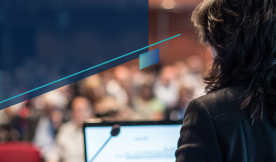Ecosystem Building, Accelerators, and How to Innovate in the Cleantech Field: a Q&A with GIST Innovation Hub Berytech of Lebanon
Berytech is an entrepreneurship ecosystem building organization in Beirut, Lebanon and a GIST Innovation Hub. Elias Nicolas is Berytech’s Cleantech Specialist in the Cleantech Track of the ACT Smart Innovation Hub initiative.
This conversation between Elias Nicolas and VentureWell’s Genesis Lodise was conducted on 27 April, 2021 and was edited for clarity. VentureWell is the GIST initiative’s primary implementing partner.
GIST: Elias, thanks so much for taking the time to talk with the GIST community about the work Berytech is doing to support cleantech innovators in Lebanon and the MENA region. Maybe we can start with the accelerator programs Berytech is running?
Berytech: Sure. In partnership with the Netherlands Embassy, we are providing accelerator programs as part of five different pillars to support the Lebanese startup ecosystem. Agrytech is an accelerator for ideas related to the agriculture and food sectors. The Cleanenergy program is also an accelerator focused on clean energy. We divide the cleantech sector into renewable energy, energy efficiency, transportation, wastewater treatment and water management, and solid waste management.
Beyond the accelerators, there is the third pillar that utilizes think tanks in partnership with the American University of Beirut. The think tanks generate materials such as white papers and policy recommendations to enable the innovation in the cleantech sectors.
We also have a cluster called a QOOT Cluster and it is related to SMEs and big players in the agriculture and food sector in Lebanon. Their a primary goal is to lobby for more collaboration, while also highlighting the needs and challenges in the sector.
Pillar number five is called the IP Valorization program. We work with universities to help them translate some of their research projects to the outside world.
What makes us quite unique is that unlike some accelerators, we don’t ask for equity in the startups. Through a partnership with the Netherlands Embassy, we are able to offer startups accelerator services and grants.
GIST: Tell us a bit more about the Cleanergy Accelerator. What can participants expect from entering the program?
Berytech: The program is 11 months long with three phases. In the first phase, the startups go through the validation process. They focus on validating the problem that they are trying to solve, and the solution that they are proposing. Of those startups, a select few are chosen to continue into the second phase. In the second phase, the teams spend four months developing their first minimum viable product, or MVP.
Based on the validation they've done in the first phase, they start implementing, doing the testing and all of that, in order to get an MVP ready by the end of the second phase. At that point, we have a selection event and around eight teams move into the Incubation phase where we help them to get investment ready. During incubation, they work on their financial model, the business model, and make sure that they are ready to pitch in front of an investor. We also help them find early adopters for their MVP so they can have some success stories. In this final phase, which is five months long, we give them a matching grant of up to $20k USD. Whatever they can pay themselves, we will match up to that amount. We like them to have some skin in the game. In total, we offer up to $100k between cash and in-kind support through workshops, business and technical training, and expert mentorship.
“For the Cleanergy program we had around 250 applications. For the current batch of Agrytech, though, we had more than 400 applications.”
GIST: It sounds really well put together, very well thought through. And I love how many sectors you've included. You mentioned renewable energy, wastewater, transportation, agriculture. Those are huge industries that innovators can make such a tremendous impact in.
You have also established some really strong partnerships. The Netherlands Embassy and the partnership with the American University of Beirut. And the work you are doing bringing ideas out of the lab and into the market. What you’ve done by pulling together all of these resources is ensure that there's a full ecosystem to support the innovators coming through your programs.
What phase is your Cleanergy cohort in right now?
Berytech: The first cohort is now in the third phase and we are expecting to finish around the beginning of August. So we're already working on the outreach plan for the second cohort, which is going to start at the beginning of September.
“It’s a safe space for them to try something new and potentially fail without it being a huge setback.”
GIST: What kind of outreach are you finding effective for recruiting participants?
Berytech: We have a series of events like Idea-a-thons and hackathons that we do to start our application pipeline. We also have webinars that we call the Cleantech Learning Series. We also collaborate with multiple universities.
GIST: How have your teams changed over the recent years with the global economic downturn caused by the pandemic but also with the blast in August of 2020?
Berytech: We're in a very bad economic situation, to be honest. Usually more established professionals are less likely to take big risks like joining a startup because they might have less flexibility. But we have high unemployment here in Lebanon and for the first time we’re seeing more older applicants with much more experience who have recently lost their jobs. They are looking to start something new. Their prior experience can actually really help when you're building a startup.
We're amazed and happy with the results that we have had so far with the first cohort. For the Cleanergy program we had around 250 applications. For the current batch of Agrytech, though, we had more than 400 applications. It shows that many people are more interested in taking the risk and starting their own business and they are seeing the value of the program that we are providing. It’s a safe space for them to try something new and potentially fail without it being a huge setback. Our program provides a good number of experts and training though to minimize the teams chances of failure.
GIST:It sounds like there's a strong demand from people who are a little bit further along in their career, who are now out of work and looking at entrepreneurship and innovation as a way to get back into the workforce and rebuild the economy. Do your participants with more experience in the workforce get paired with the younger ones who haven't as much experience?
Berytech: It does happen. Through events, such as our Idea-a-thon, participants get to meet each other and come up with their ideas for entering the competition. Older participants do pair with younger ones but they also find other older professionals with complementary skills to build out their team.
“One of the challenges that can really make or break a startup is how good their network is.”
GIST: What types of solutions are you seeing coming out of these programs have you most excited?
Berytech: Since we talked about waste I’ll use that as an example. Typically more than 50% of our waste is organic waste, but we don’t do a good job of sorting the kinds of waste. We have teams focusing on just getting clean recyclables separated from the organic waste and getting that ready for other processes. We have one team that is trying to start a anaerobic digester system where restaurants, hospitals and other businesses transform this organic waste locally into a biogas that they can then use.
Right now, Lebanon is having to import everything so being able to make gas locally would help to minimize the consumption of imported materials.
That would be very valuable, especially if we can translate this process into the European region where they usually have relatively high tariffs on gas consumption.
Another thing is composting. Many groups are focusing on composting and getting it to be more efficient and accepted. We have people doing it on a small scale trying to target households and small businesses, while other others are doing it on a larger scale as they try to target big farms.
GIST: As I understand it, the organic waste contributes significantly to air pollution, through the release of methane gases and such if we just put that into a landfill.
Berytech: Yeah, that's true. And we're putting it into landfills mixed with other recyclables that we can also reuse.
There are also teams working on handling the recyclables and automatically sorting them, for example. They are providing facilities management with applications and dashboards to be more efficient and to monitor how the automatic sorting is being done. Some are even introducing AI solutions to better automate the process.
We had some teams working on automatic robots to clean solar panels. The Gulf region where the desert and solar farms are located generates a lot of dust, which is significantly affecting the solar panels’ efficiency. There are already some bots in this field but they are not nearly as effective or efficient as they could be, so there’s a lot of potential for improvement.
GIST: For the innovators who are considering entering into climate tech or cleantech, who are coming out of the lab, what advice do you give them? What are some things they need to be prepared for that might be different from going into just building an app for food service?
Berytech: One of the challenges that can really make or break a startup is how good their network is. It’s very important to have outside expertise to help with what you don’t know.
For example, you need expertise on how to deal with government projects because many of these aspects of cleantech are usually handled by municipalities or government entities. It's a longer sales cycle when you work with the government. It's not like you start talking now about a project and you close with them in a month or two. It's a much longer cycle. You need to become a vendor for the municipality so the government can then get bids from different companies. There are specific requirements for the process.
Also take into consideration that innovation is something new. That’s also a bit tricky because governments tend to go with what they already use. We always try to tweak the business model for our startups to have target personas other than the government at the beginning so they can start building their portfolio and their success stories.
Another point is that we always encourage startups to have at least a few advisors. You may be very good at what you're doing, you know the presentation, you know the theory behind what you're saying, and it's a very valid idea that you're bringing to the table, but we need to make sure that you are on the right track, and that you have the right approach to penetrate the market. Your startup needs to show that it is sustainable and can scale so when investors invest in you, they can see that you understand how you're going to sell your product, and what partnerships you need to succeed. Ultimately, we want the startups to succeed, so we’re going to ensure they have the tools to do so.
Want to get great stories like this one delivered directly to your inbox? Subscribe to our monthly newsletter and we'll even throw in our favorite posts from social media and any new or exciting opportunities!


